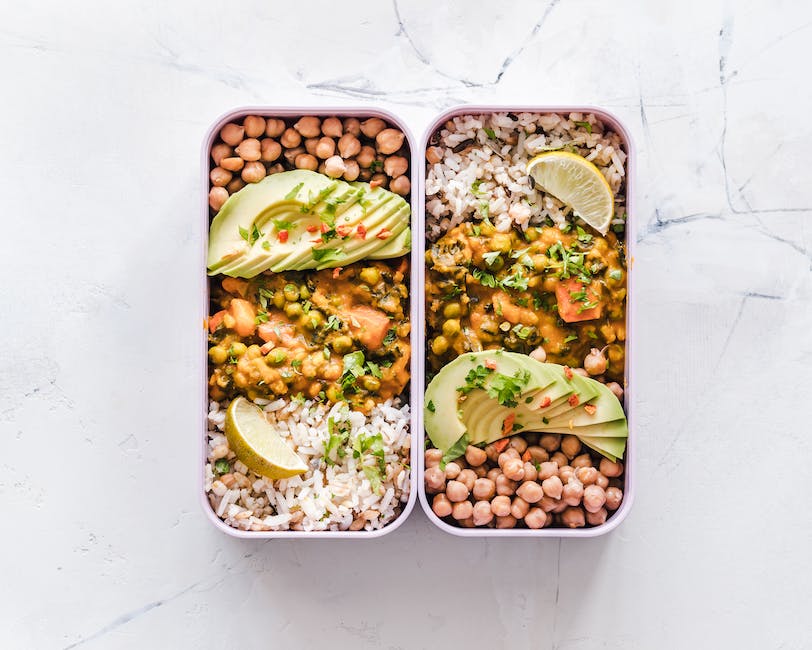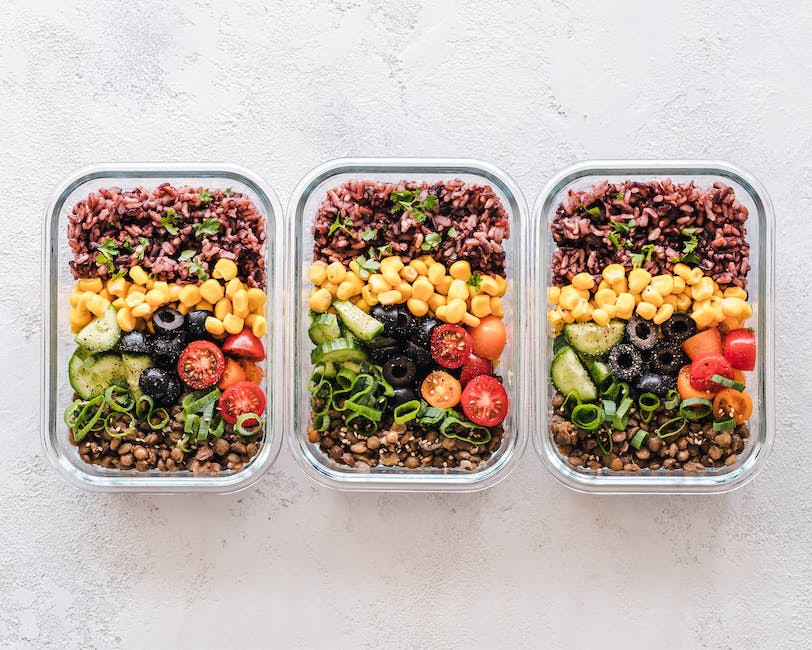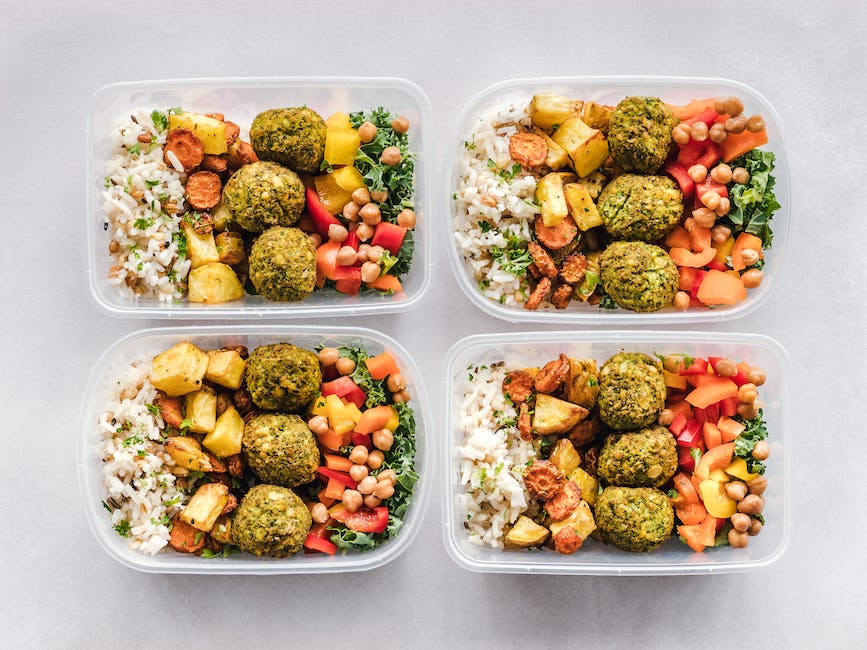As a runner, it’s important to fuel your body with the right nutrients to optimize your performance and recovery. Meal prepping can be a fantastic way to ensure that you’re getting the right balance of macronutrients and micronutrients throughout the week while saving time and money. Here are some of the key benefits of meal prepping for runners:

Maximize Nutrition and Energy
When you meal prep, you have control over the ingredients and portion sizes in your meals. This means you can ensure that you’re getting enough protein, carbohydrates, healthy fats, and essential vitamins and minerals to support your running goals. By fueling your body with high-quality, nutrient-dense foods, you’ll have more energy and stamina for your workouts and races.
Save Time and Money
Meal prepping can also save you time and money in the long run. By cooking in bulk and portioning out your meals for the week, you won’t have to spend as much time in the kitchen each day. You also won’t be as tempted to eat out or order takeout, which can be more expensive and less nutritious than homemade meals.

Reduce Stress and Improve Consistency
By planning and prepping your meals in advance, you can reduce stress and improve consistency in your diet. Instead of worrying about what you’re going to eat each day and scrambling to find healthy options, you’ll have everything on hand and ready to go. This can also reduce decision fatigue and help you stick to your nutrition goals.
How to Choose Your Meal Plan Based on Your Running Goals
When it comes to meal prepping for runners, one size doesn’t fit all. The types and amounts of nutrients you need will depend on your individual running goals and needs. Here are some tips for choosing a meal plan that’s tailored to your specific goals:
Identify Your Running Goals
Before you start meal prepping, take some time to identify your running goals. Are you training for a marathon or other endurance event? Do you want to increase your speed and power for shorter races? Are you trying to improve your overall health and wellness? Once you know your goals, you can choose a meal plan that will support your training and performance needs.
Determine Your Caloric Needs and Macros
To support your running goals, you need to make sure you’re consuming enough calories and the right balance of macronutrients (protein, carbohydrates, and healthy fats). Use an online calculator or work with a nutritionist to determine your daily caloric needs and macros based on your goals, body composition, and activity level.
Consider Your Nutrient Needs
In addition to macros, you also need to ensure that you’re getting enough micronutrients (vitamins and minerals) to support overall health and wellness. Include a variety of colorful fruits and vegetables in your meal plan to ensure you’re getting a range of vitamins and minerals.
A Step-by-Step Guide to Planning Your Weekly Meals
Now that you know the benefits of meal prepping and how to choose a plan based on your running goals, it’s time to start planning your meals. Here’s a step-by-step guide to help you get started:
Step 1: Set a Goal
What do you want to achieve through meal prepping? Is it saving time, eating a more balanced diet, losing weight, or something else? Identify your goal so that you can create a plan that aligns with it.
Step 2: Choose Recipes
Select recipes that align with your goal and dietary needs. Consider the time it takes to prepare each recipe, how many servings you’ll need for the week, and whether the recipe is suitable for meal prepping and storage. You can find plenty of meal prep recipe ideas online or in cookbooks.
Step 3: Make a Grocery List
Based on the recipes you’ve chosen, make a grocery list of the ingredients you’ll need. This will help you stay organized and save time when grocery shopping.
Step 4: Prep Your Ingredients
Once you’ve bought your groceries, take time to prep your ingredients. This includes washing and chopping fruits and vegetables, cooking your proteins, and portioning out your meals into containers. Having everything prepped and ready to go will make assembling your meals quick and easy throughout the week.
Step 5: Store Your Meals
Store your meals in airtight containers in the fridge or freezer. Label your containers with the date and contents so that you can keep track of what you’ve made and when it expires.
By following these steps, you can create a meal prep plan that saves time, supports your running goals, and ensures that you’re fueling your body with the right nutrients.
Tips for Efficient Grocery Shopping and Food Storage
Going grocery shopping can be a daunting task, but with a little bit of planning, you can make it an efficient and stress-free experience. Here are some tips to help you make the most of your grocery shopping trips:
Plan Ahead
Before heading to the store, make a list of the items you need to buy. This will help you stay on track and avoid any impulse purchases. You can also save time by planning your meals for the week ahead of time, so you know exactly what ingredients you need.
Shop the Perimeter
The healthiest foods are usually located around the perimeter of the store, so start there. This is where you’ll find fresh produce, meat, dairy, and eggs. These foods are usually less processed and have fewer additives than pre-packaged foods found in the middle aisles.
Buy in Bulk
Buying in bulk can be a great way to save money and reduce waste. Look for items like nuts, seeds, grains, and legumes that can be stored for a long time without going bad.
Store Food Properly
Proper food storage can help prevent spoilage and waste. Keep your fridge and pantry organized and clean, and make sure you’re storing foods at the appropriate temperature. You can also use air-tight containers to keep food fresh for longer.
By following these tips, not only will you save time and money at the grocery store, but you’ll also ensure that the food you buy stays fresh and nutritious throughout the week.
Simple and Nutritious Meal Prep Recipes for Runners
Meal prepping doesn’t have to be complicated – in fact, it can be quite simple with the right recipes. Here are a few ideas for easy and nutritious meal prep recipes to try:
Overnight Oats
Overnight oats are a great grab-and-go breakfast option that can be customized to your taste preferences. Simply mix oats with your choice of milk, yogurt, fruit, and sweeteners like honey or maple syrup. Let it sit in the fridge overnight and enjoy it cold the next morning.
Mason Jar Salads
Mason jar salads are a convenient way to prep your lunches for the week without sacrificing flavor. Start by layering the ingredients in a mason jar in the order you want them to be assembled. Begin with the dressing, followed by hardier ingredients like grains or proteins, then layer in soft ingredients like veggies, cheese, and nuts. Shake the jar before eating, and you’re good to go.
Sheet Pan Dinners
Sheet pan dinners are a great way to prep a full meal with minimal effort and cleanup. Simply toss veggies and protein on a sheet pan with your desired seasonings and bake in the oven. You can also add a grain like quinoa for a complete meal.
By trying out some of these simple meal prep recipes, you can ensure that you’re fueling your body with nutritious meals throughout the week without sacrificing time or flavor.
How to Customize Your Meals for Optimal Fueling and Recovery
As a runner, you have unique nutritional needs depending on factors like the intensity of your training, your body weight, and your goals. Here are some tips on customizing your meals for optimal fueling and recovery:
Timing of Meals
Timing your meals is important for fueling your runs and aiding in recovery. Aim to have a meal or snack 2-3 hours before your run to provide energy, and a meal or snack within 30 minutes of completing your run to aid in recovery. Make sure to include a combination of carbohydrates and protein in these meals or snacks.
Macronutrient Balance
To optimize your performance and recovery, aim for a balance of macronutrients (proteins, carbohydrates, and healthy fats) in your meals. The amount of each macronutrient you need will depend on your individual needs, but a general guideline is to aim for around 60% carbohydrates, 20% protein, and 20% healthy fats.
Hydration
Hydration is also important for runners, especially during and after your runs. Aim to drink water throughout the day and before, during, and after your run. You can also include hydrating foods like fruits and vegetables in your meals to help maintain proper hydration levels.
By customizing your meals with timing, macronutrient balance, and hydration in mind, you can optimize your fueling and recovery for better running performance.
Staying Motivated and Consistent with Your Meal Prepping Routine
Starting a meal prepping routine can be challenging, and it’s important to stay motivated and consistent to see the benefits. Here are some tips to help you stay on track:
Set Realistic Goals
Start small and set realistic goals for yourself. Maybe you start by meal prepping for just one or two days a week and gradually work your way up to a full week. Celebrate your successes along the way, no matter how small.
Get Organized
Having a designated meal prep day and time can help you stay organized and consistent. Make it a habit to plan your meals, grocery shop, and prepare your meals on the same day each week.
Mix it Up
Eating the same meals every day can get boring, so switch up your meal prep recipes and try new foods to keep things interesting. You can also involve your friends and family in meal prep activities and make it a fun and social event.
Stay Accountable
Find a friend or family member who can help keep you accountable and motivated. You can also join a meal prep group or challenge online for support and accountability.
By incorporating these tips into your meal prep routine, you can stay motivated, consistent, and successful in fueling your running and overall health goals.

